How to Start a Dev Blog: Step-by-Step Guide Plus 5 Best Dev Blogging Platforms
Do you want to create a dev blog but aren't sure where to start?
I got you.
In this article, I'll go in-depth about how to set up your website, what to consider while doing it, and review some popular dev blogging platforms that could be a great starting point for your blogging career.
Let's discuss why we highly encourage you to create your own blog and which benefits could come out of it.
Benefits of starting your own dev blog
If you're considering starting a programming blog, we highly encourage you to do so.
Even if you're not that proficient in writing, it's a great way to practice your skills, reach a wider audience and share your knowledge.

Moreover, writing about your interests and experience will only fortify what you already know, which is just an added benefit.
If you're still not convinced, here are some other reasons why you should start your own developer blog:
Building an online audience
Building an online audience is a great way to show off your skills, experience and knowledge.
You will become an authority in your own right, which we'll discuss a bit further in the section below.
There are many benefits of building an online presence, such as networking with other important figures in your field, gathering experience and suggestions from your audience on how to improve your blog, and receiving other great business opportunities.
Become an authority figure in your field
Building a big audience and social media presence will help you become an authority figure in your field.
This allows you to become a thought leader and an individual who has the power to influence their readers, as well as their respective industry.
Becoming an authority figure will also expose you to traditional media, so don't be surprised if you get phone calls or emails from prominent media outlets asking for your comment on critical industry-related issues.
Moreover, you'll have an easier time scoring great jobs or even starting your own business or consultancy firm.
Earning a side income
Monetizing your content through different channels and sponsorships has never been easier in today's social media culture.
You can monetize your blog through affiliate partnerships, AdSense, sponsorships, and many other opportunities that will come your way if you become successful enough.
Moreover, you can branch out into other platforms like YouTube, TikTok and Instagram.
They have dedicated creator programs to receive compensation for user engagement, views, comments, likes and shares.
Your side income will start off slowly, but if you're persistent, you'll get fantastic monetary opportunities in no time.
Who knows, you might even get a chance to work alongside your idols or other influential figures in your industry.
Improving your writing and technical skills
There's no better way to perfect your knowledge than trying to share it with others.
Sharing your knowledge with others forces you to take on a different perspective and break down your knowledge and complex ideas into simple concepts that even inexperienced users can understand.
Not only that, but teaching also pushes you to explore these topics further, which will make you a better expert in the long run.
As a software developer, you're often stuck at your computer coding, with little to no communication with others.
Starting your blog will also improve your writing and communication skills which you can later apply to other areas in your life.
Become more experienced with SEO and marketing
Marketing and SEO have become a crucial part of any business strategy, so improving your knowledge in these areas will help you if you ever plan to start your own business or market your services in the freelance world.
This is how you improve your traffic and gain more views and clicks.
How to create your own dev blog
While starting your blog can be time-consuming at first, rest assured that it's much easier than you think.
Not only because you have a lot of excellent platforms and resources available online, but also because you can find a bunch of tutorials and examples you can use before you figure it out for yourself.
We want to make this process even easier for you, which is why we'll share some of the essential steps and tips for starting your blog:
Purchase a domain name
Your domain name is going to be the name of your website.
We highly recommend getting a personalized domain such as domainname.com instead of free domains like domain.wordpress.com or dev.to/username because it sounds more serious and is much better for branding.
Choosing a domain name is an art form, so be careful what you choose because you'll have to stick with it in the long run.
It's something that your audience will recognize you by and it's how you'll be presenting yourself and your knowledge to the world.
Here are some quick tips on choosing the perfect domain name:
- keep it short
- make it recognizable
- use relevant terms like dev, software, programming, etc.
- check whether someone has already taken a similar name
Choose a programming niche
If you want to run a successful blog, it's essential to narrow down your niche as much as possible because it will make it easier to target the desired audience.
This is not only helpful for your audience, but it also gives Google a specific signal about where to promote your content.
Once you nail your current niche, you can slowly expand into other niches. If you try to do everything at once, you'll get lost in your own content and it won't be as effective.
Choose a web hosting service
Every website, including your blog, is powered by a hosting service. Choosing a reliable hosting provider is imperative because it will impact your website's quality, reliability, and speed.
You can find a wide variety of hosting services online through a quick Google search.
However, make sure to learn all the specifics and read user reviews to ensure that your choice is correct.
There are also different types of web hosting, here's what you should know about each type:
- Shared hosting - is usually cheaper and means that your website will be hosted on the same virtual machine as other websites hosted by that provider. The downsides of shared hosting are slower speeds, limited resources, poor customer support and poor security.
- VPS hosting - VPS stands for _virtual private server _and, unlike shared hosting, this type lets you have the whole virtual machine to yourself, as well as root access to it. This is very reliable.
- Dedicated hosting - is not to be confused with VPS hosting. Dedicated hosting means that you'll own the actual physical server instead of just a virtual machine. It's more expensive, but also much more reliable.
- Cloud hosting - lets you use resources from multiple servers, unlike other hosting types where they draw resources from one physical server.
Once you choose a web hosting service and purchase a domain name, it's time to connect them.
Here is how to do that:
- Log into your domain account
- Locate the management page for that particular domain
- Open DNS settings and locate the servers page
- Choose to add a custom server
- Enter your server's address
- Save your settings.
Secure your website with encryption
Some dev blogging platforms like Hashnode will provide you with a free SSL certificate upon signing up, while others won't.
If you use a service that doesn't provide you with any security certificates, make sure to enable it on your own - this will protect your intellectual property and your audience's privacy.
Customize and personalize your website
Now that you've taken care of all the basics, it's time to have some fun. Personalizing your website is a must because you want to show off your personality and gain your audience's sympathies.
Choose a color palette, custom fonts and other elements that make your website unique.
Make sure that your personalization is consistent with the brand you want to showcase to the world.
Use similar colors and elements across your other social media pages to increase brand awareness and to make yourself recognizable in the sea of other boring blogs. Also, optimize your website for mobile devices.
Don't forget about UI and UX either. Instead of only thinking about what you like, consider your audience.
Include different elements and widgets to make their user experience pleasurable and fun. Use high-quality images and plugins that will make everything more immersive. Lastly, don't forget to include social share buttons to inspire your readers to disseminate your content on their socials.
Index your website and take care of SEO
Indexing your website means that you're giving Google signals that it's ready to be added to the search engine.
This is also the time to maximize your SEO efforts and improve your website's visibility.
Do keyword research to see the most popular search terms for your niche. See what your competitors are doing and try to be better.
You can use tools like Google Search Console, Ahrefs and Moz to do some SEO research and analyze what you need to do to push your content to the first page on Google.
Write your first blog post
Now that your website is prepared, it's time to publish your first blog post.
Your first blog post can be a brief introduction where you'll share some basic information about yourself and your vision for the blog.
Or, if you'd like to keep things less personal, you can go straight into writing technical topics. Extra tip - include a table of contents for each article for easier page navigation.
We highly recommend choosing low-competition keywords for your first blog post. Go through GSC or Ahrefs and look for keywords and topics that don't have that many search results in the SERP.
This will improve your chances of getting your content into the top 10 search results.
5 Best dev blog websites
Now that you have all the tools and knowledge to set up your own developer blog let's explore some of the best platforms to share your blogs and get noticed by readers.
We've thoroughly reviewed the top five dev blog options and included the following criteria:
- User reviews
- Free trial
- Pricing
- Support
- Features
- Pros & cons
Hashnode
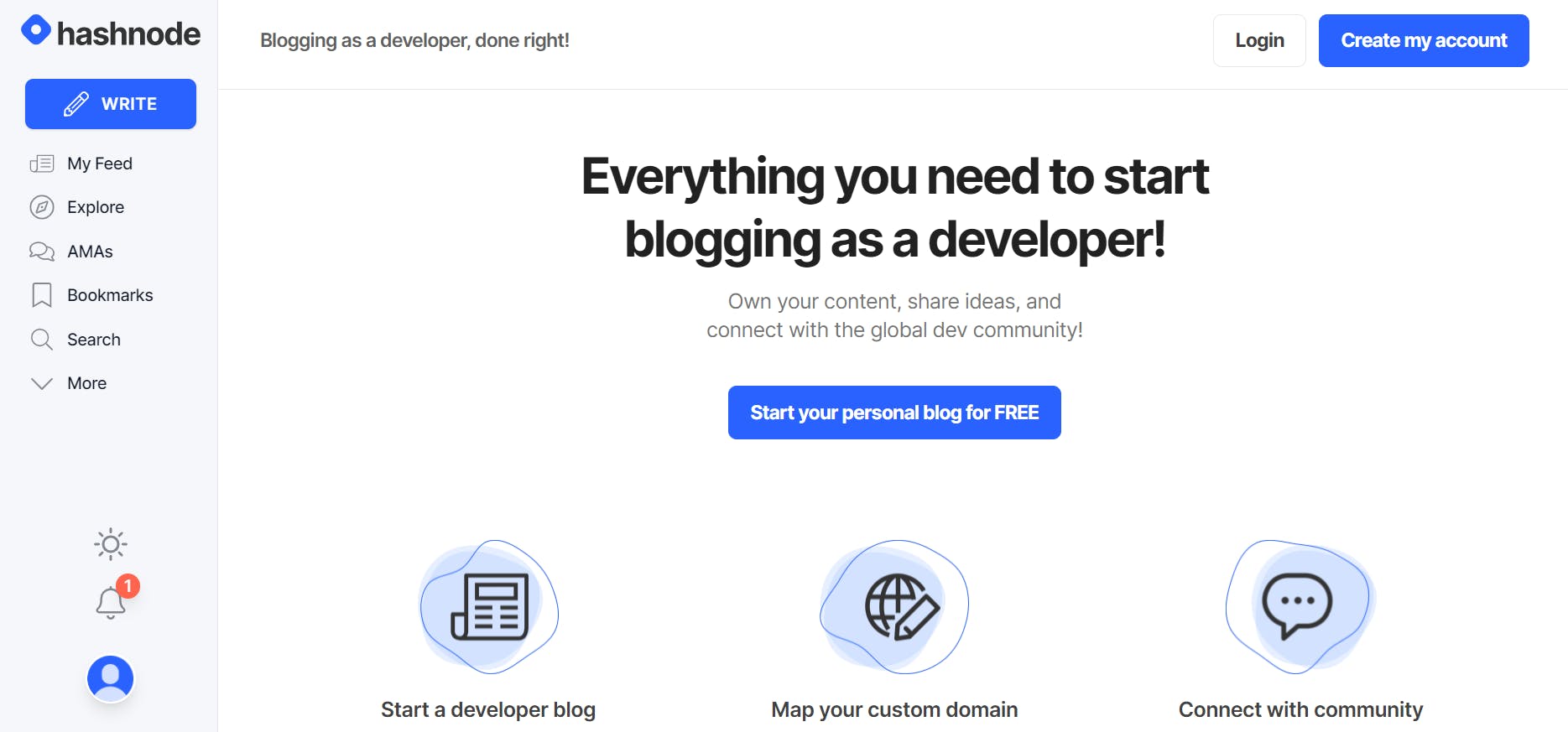
User review - ProductHunt: "Hashnode is one awesome blogging community and they have revolutionized the concept of 'blogging' for techies. I have personally worked with Startups for over 4 years and one thing I can say with conviction is that the worth of a product can only truly be measured by how the users feel while they use the product. In that regard, Hashnode has left no stone unturned in terms of listening to their users continuously and incorporating changes slowly and steadily to be where they are today."
Free trial: No - the platform is free for everyone.
Pricing: Free of charge.
Support: 24/7 support through email, communities, Discord servers and a rich knowledge base.
Hashnode is a favorite resource and blogging platform for software developers worldwide.
There are a lot of useful blogging sites out there for engineers, but Hashnode has really made a name for itself, even though it's a relatively new platform for developers compared to other similar websites.
What's great about Hashnode is that it was created specifically for individuals who are passionate about software development.
It was developed with this niche in mind and the creators of this platform continuously listened to suggestions and thoughts from their community, which is why they have such a faithful audience.
Another great thing about this platform is that you don't have to spend an insane amount of time marketing.
They boast a massive community that is constantly exposed to your content, and because their community is so close-knit, you'll get a lot of shares and likes rather quickly.
The platform runs occasional Hackathons and rewards users who perform well. You'll get some impressive customizations features and rights to your content.
Creating your dev blog will be a breeze with Hashnode.
Features:
- automatic GitHub backup
- writing in markdown
- creating custom domains
- edge cashing with SSL
- built-in newsletter service that includes analytics
- free SSL certificates
Pros:
- you receive a free .hashnode domain upon signup
- impressive security
- it's easy to customize
- offers a wide variety of integrations
- you get to keep all SEO benefits if you decide to migrate to another platform
Cons:
- no third-party plugins
- you need to pay for a personalized domain
- analytics isn't that detailed
WordPress
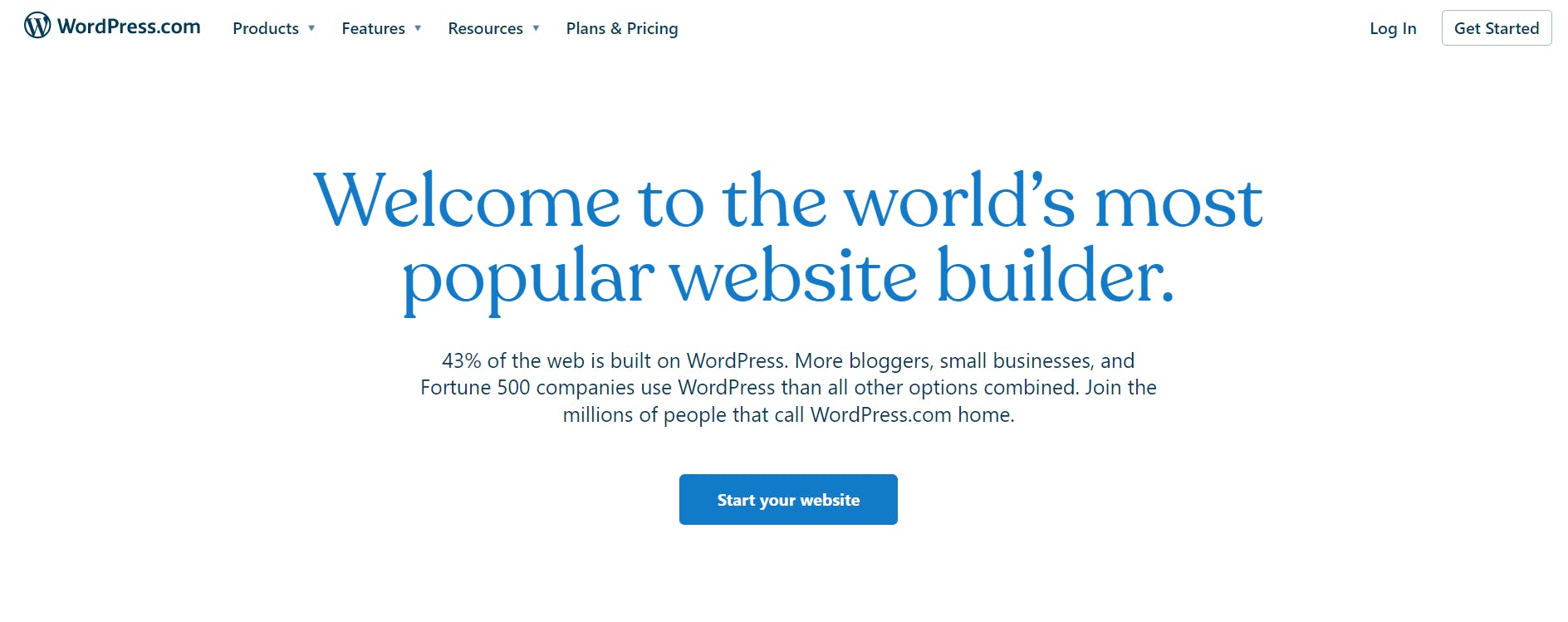
User review - G2: "Though the initial focus of WordPress was as a blog publishing platform, the thriving third-party and community-built plugins and extensions have long since established it as a full-fledged content management system capable of handling endless varieties of website configurations."
Free trial: No, but you can try out the free plan with limited features.
Pricing: Free; Personal - $4 per month; Premium - $8 per month; Business - $25 per month; eCommerce - $45 per month;
Support: unlimited email support, live chat support, phone support, support pages, forums.
WordPress is another popular tool for blogs of any kind, including dev blogs. What makes it particularly suitable for developers is that they can use their vast coding knowledge to create the website of their dreams.
WordPress's system is highly customizable and offers a lot of plugins and integrations, which is one of the main reasons it's so prevalent within the industry.
WordPress is an open-source CMS and it currently powers almost half of all websites on the internet.
Upon signing up, you'll receive a free .wordpress.com domain. If you'd like to get a custom domain, you'll be able to obtain it for a certain fee.
One of the best features of this platform is its SEO potential.
You can connect it to Google Analytics to receive actionable insights into how your blog is performing and which steps you need to take to improve its visibility on the internet.
It also has some downsides. For example, if you don't code and set up your website correctly, it will be very slow and unresponsive.
Moreover, because it's open-source, it's more prone to hacking exploits and data breaches, so if you choose this platform, make sure to invest extra effort into securing your website correctly.
Features:
- premium design options
- automated site backups
- one-click restore
- secure hosting
- payment collections
- an extensive list of plugins
Pros:
- it's highly customizable
- it offers integrations with many services and platforms
- great for SEO
- convenient dashboard
Cons:
- prone to hackers and potential data breaches due to its open-source system
- it doesn't offer a simple drag-and-drop editor
freeCodeCamp
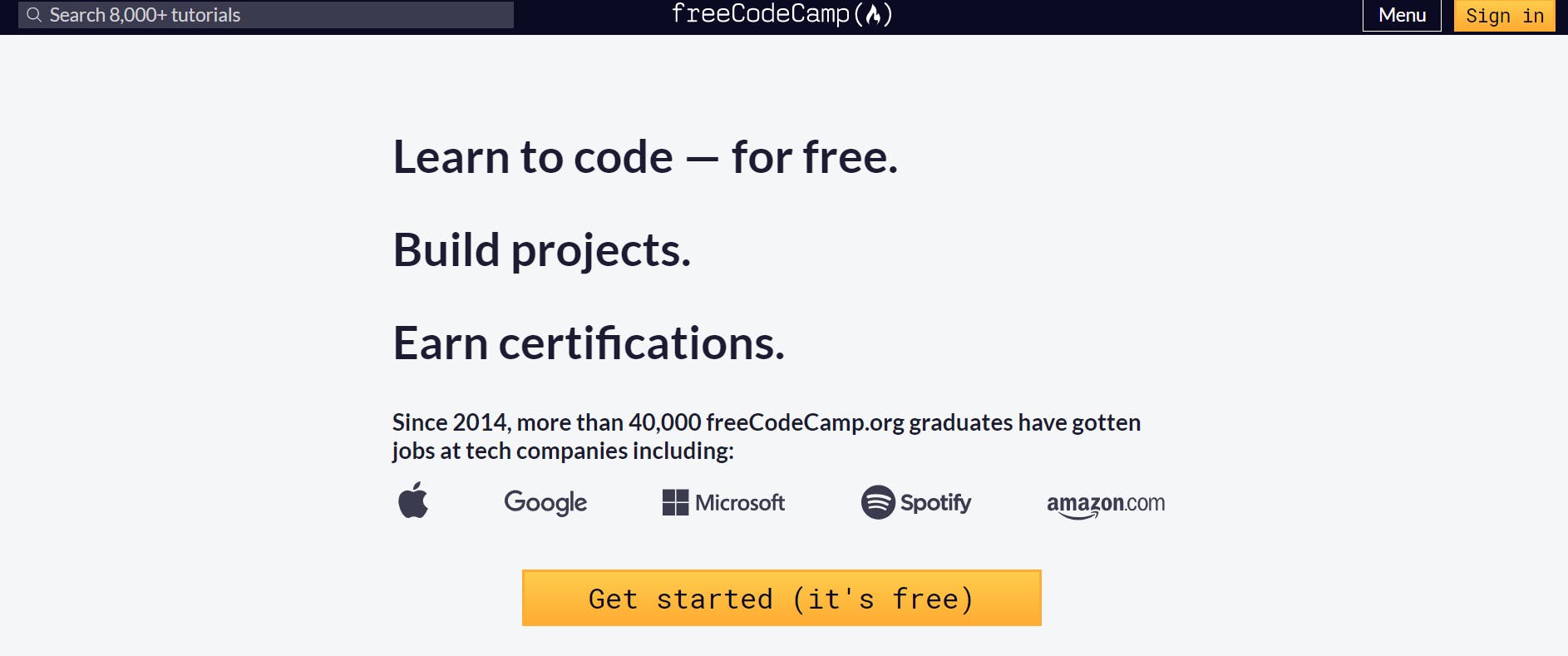
User review - ProductHunt: "I'm a huge huge fan of Quincy Larson and his freeCodeCamp, which is closely aligned with Startup Study Group's mission! I recommend to everyone to check out freeCodeCamp."
Free trial: No - the platform is free.
Pricing: Free
Support: email support; knowledge base;
If you're into writing content that's more educationally oriented, then freeCodeCamp might be a great fit. While it doesn't give you as much liberty as some other platforms on this list, it certainly has some advantages, such as a faithful reader base, an impressive editorial team, and access to their community.
freeCodeCamp runs its website in a way that resembles traditional academic journals. They take full charge of maintaining and marketing your blog, but that comes at a price - freeCodeCamp strictly forbids publishing your content on any other platform.
To start writing your tutorials or a blog post for this platform, you have to apply through a form on their website.
They require some previous examples of your writing before you're admitted into their team. It's also important to note that they enforce a very strict editorial policy, which is why many articles get rejected.
Features:
- blog analytics
- access to a professional editorial team
Pros:
- they promote your content through their massive community
- it's free
- they build and maintain your blog
Cons:
- you can't post your blog posts on other platforms
- you have to apply and get approved before you're able to start writing for them
Dev.to
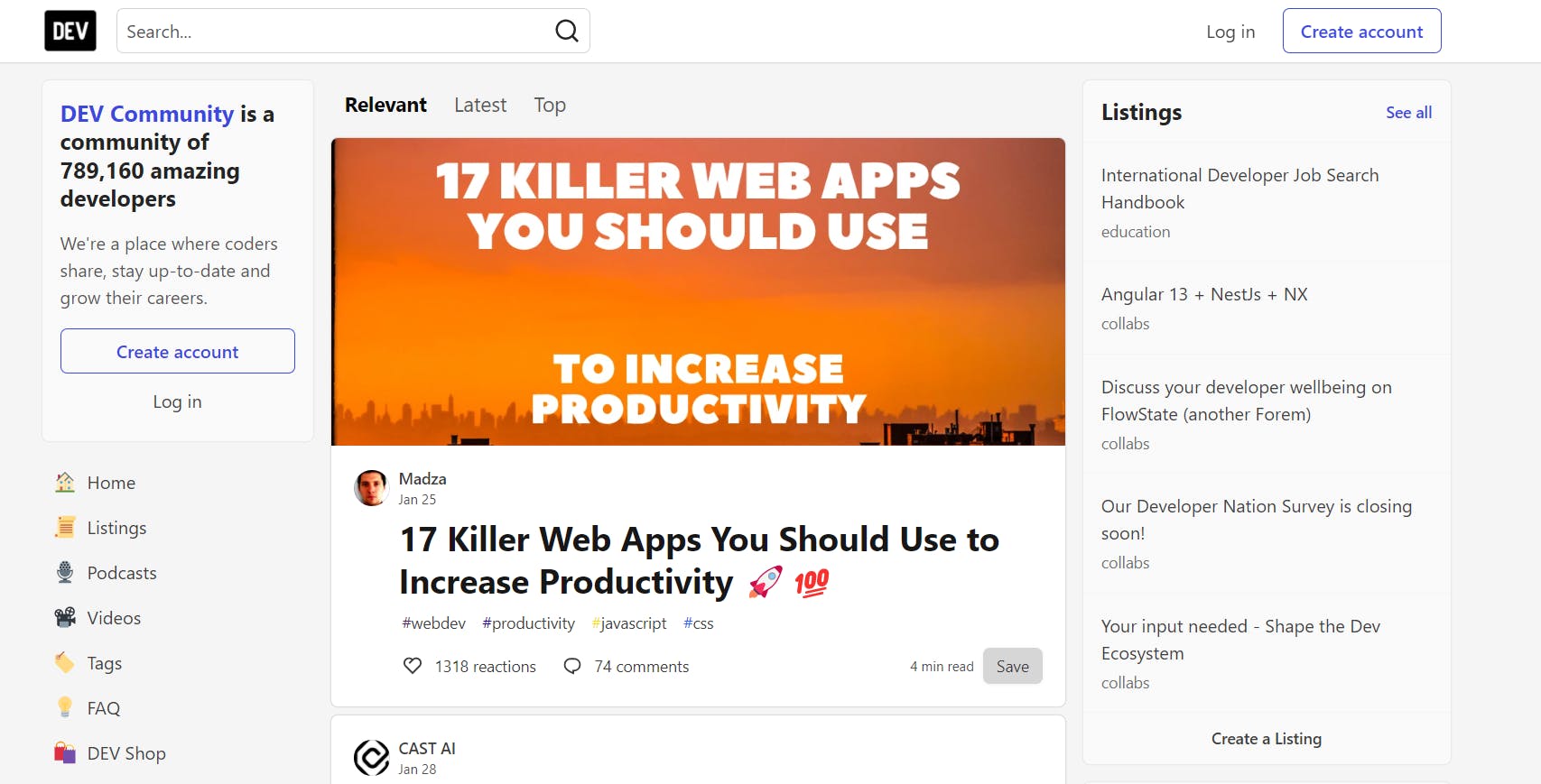
User review - ProductHunt: "I love spending my time on dev.to, I've used it for a couple of months already and it replaced Facebook and Medium for me. Keep up the good work!"
Free trial: No - the platform is free.
Pricing: Free
Support: email support; social media support;
Dev.to is another popular choice that had garnered a lot of attention when Medium decided to introduce a paywall.
Many developers have migrated to this platform and Hashnode because they are more user-oriented and take great care of their communities.
This is another platform that was created explicitly with developers in mind.
However, unlike Hashnode, for example, you won't be able to set up your own domain - you'll have to stick to dev.to/username which is questionable if you care about content ownership.
One benefit of opting for this platform is that they have a massive social following. Only their Twitter account boasts over 200k users.
When you combine that with their other social media channels, you get a pretty decent exposure.
Lastly, it is pretty good SEO-wise, which is proved by the fact that you can often find their content on the first page on Google.
Features:
- free dev.to/username domain
- markdown editor
- inline HTML
- native Liquid tags
Pros:
- good exposure
- easy to use
- developer-friendly
Cons:
- you can't have your own domain
- not many personalization features
- analytics is very basic
HackerNoon
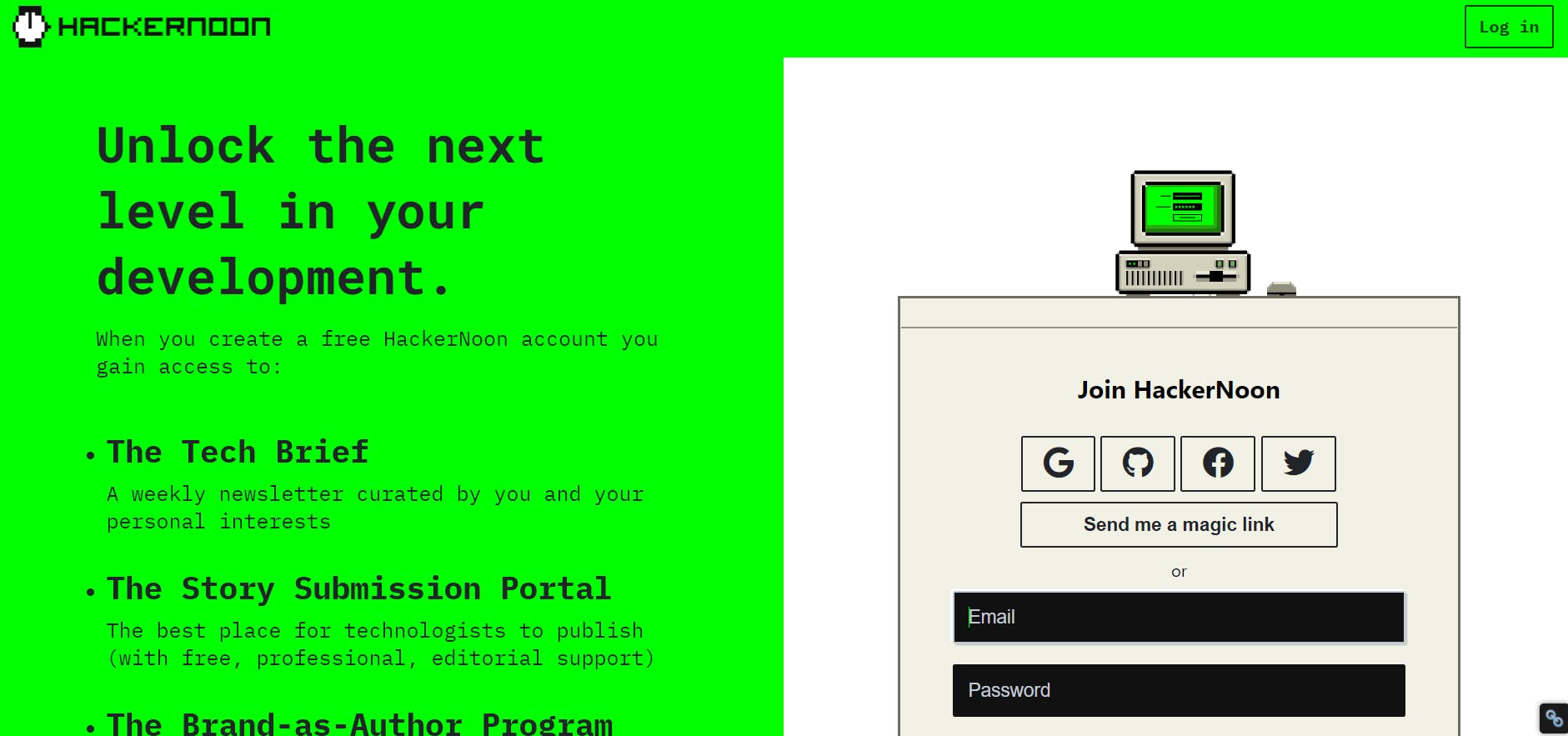
User review - Sitejabber: "I like hacker noon because the team is quite open to posting all kinds of stories.
As long as the content is good, they've even allowed affiliate links as long as the author posts full disclosure.
They are pushing towards a free blogging space for tech enthusiasts, that has more renown and recognition than posting your own blog on Medium or WordPress. HIGHLY RECOMMENDED!"
Free trial: No - the platform is free for everyone.
Pricing: Free of charge.
Support: email support;
Hacker Noon, a popular online technology and news site based in Toronto, Canada, is also a self-publishing tech blog aimed at users who want to share tech-related content with minimum effort.
It markets itself as "an independent tech blog with honest and unfettered stories and opinions written by real tech professionals. "
Hacker Noon is quite popular with readers because it's free and has a large reader base (averaging 8 million visitors per month). If you post high-quality content, you will be featured on their website.
Hacker Noon's team of editors will also showcase your material on their social media platforms, increasing your visibility, generating more traffic, and allowing you to reach a larger audience.
Go to Hacker Noon's website, sign up for an account, and begin writing. There are no other steps required.
Organize and submit your pieces for approval using their website's content editor. Hackenoon released new features in their Editor 3.0 beta version supporting WYSISYG and Markdown.
It's hard to deny that Hacker Noon has certain drawbacks compared to the other options available on this list.
Hashnode is a much better option if you want greater control over the content you submit, but if you're looking for something simple, Hackernoon might be a great fit.
Features:
- Access to the editorial team
- Accreditation
- Editor 3.0 (Beta) - WYSISYG + Markdown Support, Rich native Notion-like embeds for Tables, Code Blocks, Page Breaks, Snippets, Headings and more.
- Editor 2.0 - regular content editor with minimal features
Pros:
- it's free
- the new editor 3.0 Beta program lets you have more control over content formatting
- published content will be featured on their homepage and social media websites
Cons:
- limited capabilities compared to other blogs on this list
- it's not open source
- strict editorial policy
Ready to start your own dev blog?
Now that you know all the ins and outs of how to start your own dev blog, it's time to get started.
Since we've only discussed the most important basics in this blog post, make sure to follow up with additional research, especially about marketing and SEO.
These two are very important and can make or break the success of your blog.
Or, if you'd like to take the simpler route, try out Hashnode, which does most of the SEO work for you and market your content to their large community of developers.
You can get a custom domain and keep all your domain authority if you ever migrate to another platform. And best of all, it's completely free. Sign up here and your blogging journey can start now